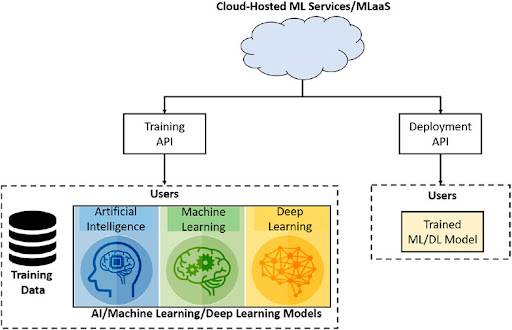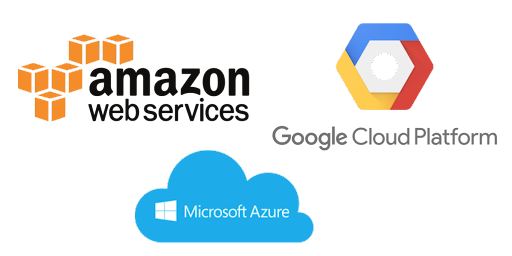Let's Discuss
Enquire NowMachine learning, one of the spearheads of artificial intelligence, opens unimaginable perspectives in today’s digital age. In the context of big data, it makes great progress in a wide variety of areas and continues what it does like an endless process
All thanks to the fact that they have received a huge boost from advances in various fields and disciplines such as math, computing power, sensors for the Internet of Things, and cloud computing. A scenario that, on the other hand, enables it to be used as a service.

ML technology has conquered our everyday life. Facial recognition systems scan us on the street. We communicate with intelligent chatbots on the web. Artificial intelligence fraud detectors protect our financial transactions. And when it comes to machine learning implementations, there’s a lot more where that comes from.
From expensive and complicated lab experiments, machine learning developments have been made affordable and easy-to-use services. Nowadays, companies see a competitive advantage in introducing ML solutions early on.
What is MLaaS

MLaaS is a rapidly evolving branch in the family of cloud-based services.
It is based on machine learning technology, which consists of teaching machines that identify specific information and learn independently of processing large amounts of data. MLaaS helps customers benefit from machine learning without the associated cost, time, and risk of building an in-house machine learning team. Infrastructure problems such as data preprocessing, model training, model evaluation, and, ultimately, forecasting can be alleviated with MLaaS.
Service providers offer tools such as predictive analytics and deep learning, APIs, data visualization, natural language processing, and more. The computing power is taken over by the service provider’s data center.
Types Of Machine Learning As A Service
NLP
NLP is a type of machine learning designed to automatically analyze all types of text for email, social media, online reviews, and customer service data. It uses advanced AI-enabled algorithms to break down texts and understand them better than humans. NLP can be used for machine translation, grammatical interpretation, pos tagging, and much more. Various platforms that offer these services include Amazon Comprehend, Azure Web Language Model API, Google Cloud Natural Language API.
Image and Video Analysis
MLaaS image and video analysis programs can be profitable because you can buy them according to your usage. CCTV surveillance is a daily use case that can record accidents and crime and use facial recognition image analysis to find criminals. However, this type of machine learning tool analyzes traffic patterns to improve control and reduce overall traffic. Machine learning as a service developer is becoming increasingly popular in retail to identify when organizers need to analyze the right product placement and improve the customer experience. Offers platforms such as Amazon Transcribe, Azure Custom Voice Service, Google Dialogflow Enterprise Edition.
Computer Vision
Computer vision uses image and video analysis to train computers in order to interpret and understand the visual world. This technology is behind things like driverless vehicles being propelled by trained ML programs for millions of miles of road. Manufacturing, remote inspection, resource management, security compliance, and theft and fraud in retail stores are important applications for machine vision.
Speech Recognition
Speech recognition software uses NLP to understand human speech. Siri and Alexa are the best-known examples of the use of this technology. However, unless you’re a large company like Amazon or Google, building your own device isn’t affordable. MLaaS speech recognition is widely used by retail chains, airlines, and banks for customer support over the phone. In addition, smartphone applications, video game consoles, and e-mail programs use this technology to improve their services.
Working of MLaaS
To put it simply, MLaaS is a suite of services that provide universal, unique, out-of-the-box machine learning tools that any organization can customize to meet their business needs. These services range from data visualization, multiple application programming interfaces, face recognition to natural language processing, predictive analysis, and in-depth studies. The MLaaS algorithms are used to look for patterns in the data. These templates are used to create mathematical models and the models themselves are then used for forecasting using the new 3 main levels of cloud AI configuration. The choice depends on your usage, automatic learning experience, and budget.
Packed MLaaS
Machine learning packaged as a service is the lowest level of MLaaS configuration. At this level, the provider maintains a packaged and ready-to-use model with a predefined set of artificial intelligence options, such as face recognition, object recognition, and text extraction.
This is the easiest because the AI provider is 100% responsible for data provision, training, testing, and deployment, so you don’t need any machine learning skills. After connecting to your library, you can immediately start using the template to tag visual content. Packaged MLaaS is implemented when a company has a relatively simple use case for AI where the more general terms of auto-tagging are acceptable to its business.
Guided MLaaS
This type of MLaaS is more complex and used to solve specific business problems. With this level of customization, the machine learning provider gives you a space to classify your own media, add images, and label them appropriately to train the model until you’re happy with your confidence level.As you are doing the training and testing, you need to understand the basic statistics and levels of accuracy. It takes some time to train the model, for example Microsoft provides around 30 images for each label in order to achieve an acceptable level of confidence. This form of MLaaS is used when a business problem cannot be solved with common auto-tags.
Specialized MLaaS
Specialized machine learning as a service is the model that offers the greatest flexibility in terms of tools, platforms and infrastructure, but it also requires a deep understanding of machine learning models and system integrations. Using specialized MLaaS, the provider provides you with a virtual machine that is pre-assembled with standard software for machine learning and plug-ins for the internal IT team or external developers to program, train, package, and provide the model. In this case, you need a data specialist and a developer or technical integrator to provide data, training, testing, and implementation. Specialized MLaaS is only used for very special cases and requires the greatest resource input of all MLaaS models.
Benefits of MLaaS
Developing your machine learning tools and programs only makes sense if you own an established business. Otherwise, MLaaS (Machine Learning as a Service) is the best way to do this for medium or small businesses. Developing your ML solution can produce great results, but it costs a lot of time and money. MLaaS, on the other hand, can achieve the same results and is generally scalable for any need.
Improved data management
Good data is essential for hands-on model training and excellent performance; However, data preparation, tagging, and management can waste productive time, especially when your most valuable records are stored deep in local systems. In addition, MLaaS platforms offer cost-effective and elastic data warehousing, pipelines for data ingestion, and toolkits for building effective data governance.
Ready To Use ML Toolkit
The new generation of platforms for machine learning is already equipped with high-quality tools, libraries and frameworks for the operation of machine learning projects. Certain vendors also have pre-built APIs for common ML use cases like predictive analytics and image recognition. With out-of-the-box configuration toolkits, you can drastically reduce setup time for new projects and improve scaling capabilities.
Rapid productivity gains
Machine learning platforms as a service enable teams to get up and running faster. It allows data scientists to focus on training, validation, and successful deployments with the appropriate infrastructure pre-configured and pre-provisioned.
Lower operational costs for ML projects
Compute power is a hot topic, especially when you need to keep buying new GPUs to scale your deployment capacities. When you subtract the cost of electrical and hardware maintenance, the deal is even better. Also, you only have to pay for the hardware when it’s used. Finally, some platforms allow experiments to be conducted in hybrid environments, mixing on-premises and cloud resources.
MLaaS Platforms

- Microsoft Azure Machine Learning Studio
Microsoft Azure provides scalable machine learning services for businesses of all sizes. Azure supports a variety of platforms, programming languages, databases, operating systems, and devices. Provides interoperability between devices compatible with major mobile platforms. - AWS Machine Learning
AWS stands for Amazon Web Service. Amazon Machine Learning is highly automated. Without building code, it helps companies build machine learning models.AWS makes machine learning available to developers without learning complex algorithms and technologies. Amazon ML is based on a pay-per-use pricing model. - IBM Watson Machine Learning (WML)
WML runs on IBM Bluemix. Both data scientists and developers use WML for training and evaluation. WML was designed to answer questions about commissioning, implementing, and deriving business value from ML models. WML also uses visual modeling tools that help users understand patterns, make decisions faster, and recognize them quickly.
Google Cloud Machine Learning Engine
The reach of Google software is almost limitless. Google’s machine learning engine is based on TensorFlow. This machine learning machine is integrated with all of the other Google services like Google Cloud Storage, Google Cloud Dataflow, Google BigQuery, and others. Google’s machine learning engine offers users a substitute for building machine learning models. The data can be of any size and type.
Future Scope
Advanced ML applications are about to revolutionize the way we work. In the near future, we will be able to predict trends with greater precision, tailor personalized user experiences, make complex business decisions supported by data-driven insights, use data to create new business opportunities or penetrate new business areas, and much more. With ML, companies can help their customers in new and meaningful ways, and with MLaaS, now is the opportunity. According to a study, the MLaaS market is set to grow 49 percent in the forecast period 2017-2023.
The synergy effect is so strong that we can expect incredible advances from MLaaS in the near future. Humanity will experience more technological engagement, access to skills and opportunities than we can imagine today. The same goes for machine learning as a service.
Another area where MLaaS could drive innovation is IoT. Since MLaaS already has the ability to integrate with different types of sensors, MLaaS could play a key role in this area, too. If you would like to know more about the services we provide regarding MLaaS, click here.
Disclaimer: The opinions expressed in this article are those of the author(s) and do not necessarily reflect the positions of Dexlock.



